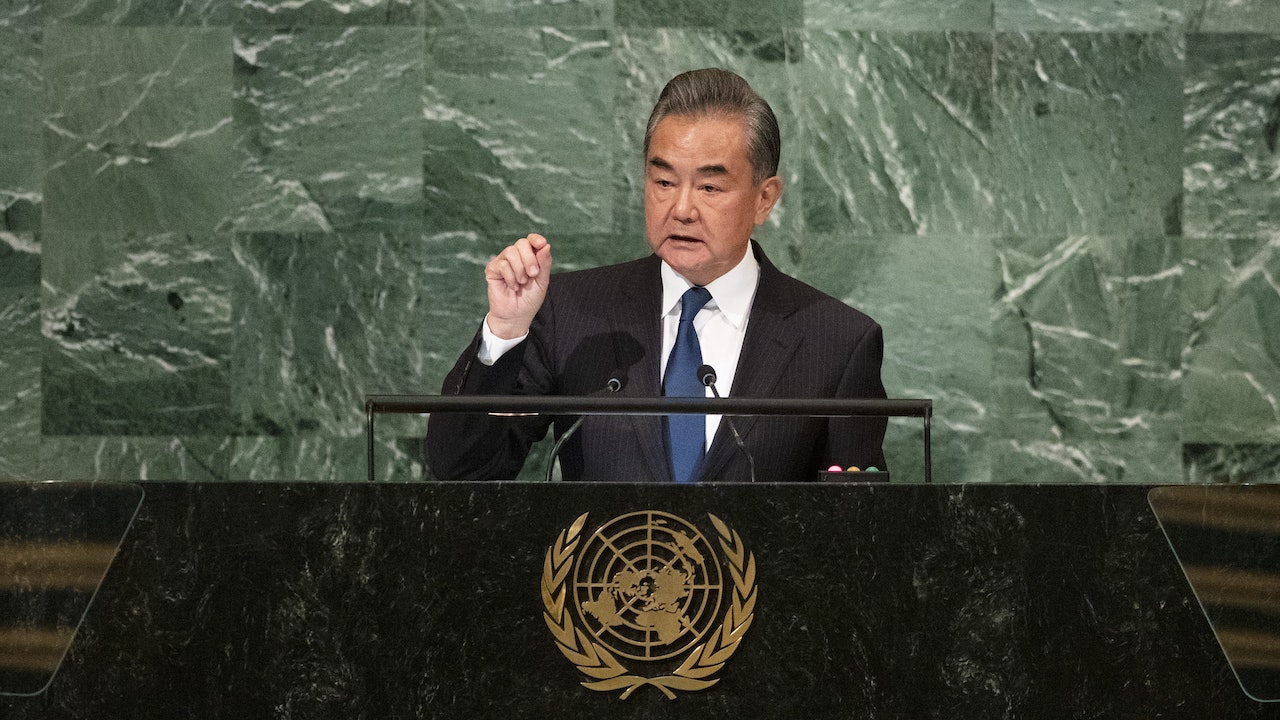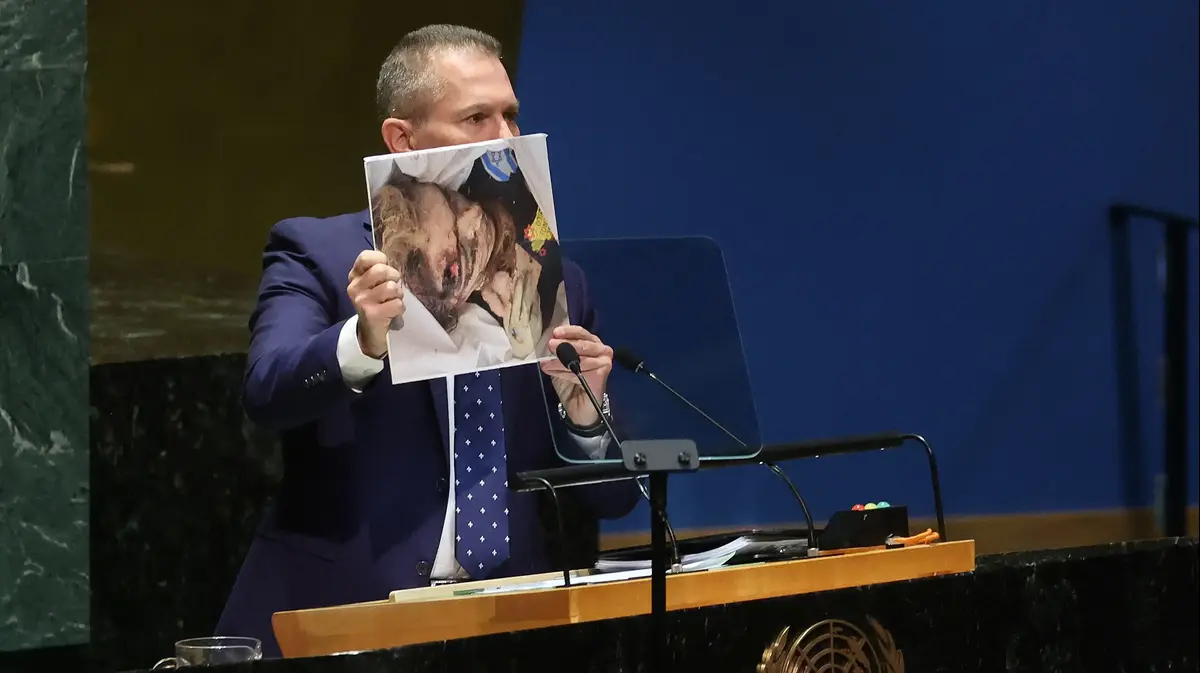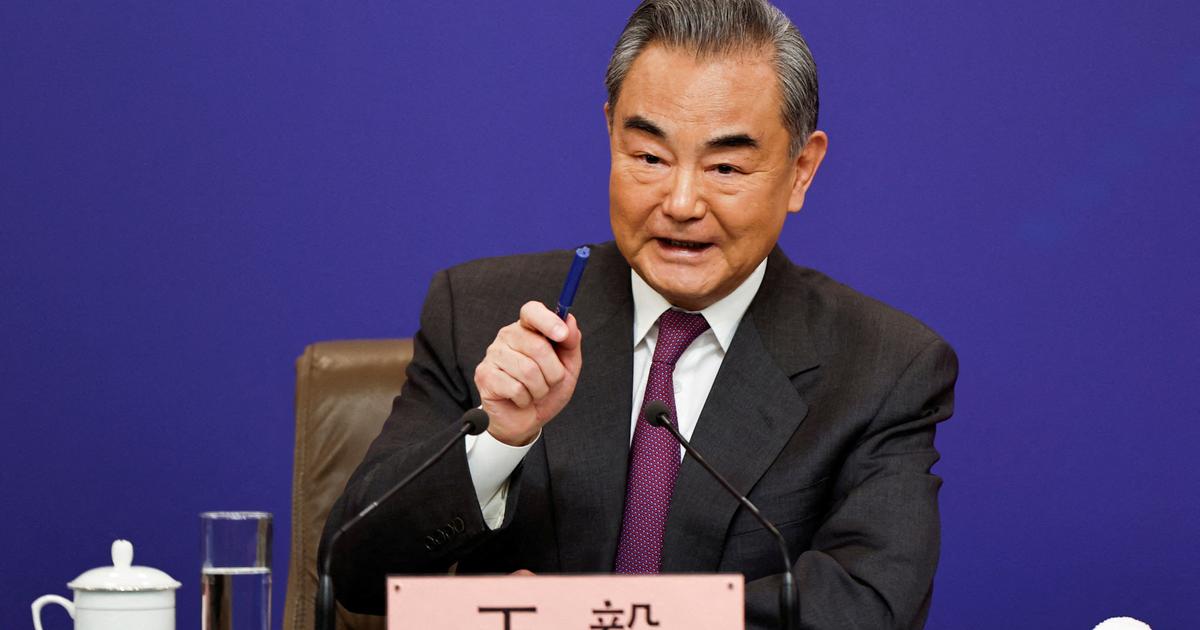State Councilor and Foreign Minister Wang Yi attended the general debate of the 77th United Nations General Assembly at the United Nations Headquarters in New York on September 24, and delivered a speech titled "Do Your Best for Peace and Development, Take Responsibility for Unity and Progress".
With Resolution 2758 passed by the United Nations General Assembly on October 25, 1971, Wang Yi emphasized that the mainland and Taiwan belong to the same China, and that "the one-China principle has become the basic norm of international relations and the general consensus of the international community."
This speech immediately attracted a high-decibel refutation from the DPP government.
Taiwan's "Ministry of Foreign Affairs" issued a press release stating that the UN General Assembly Resolution 2758 only deals with China's representation in the UN. Taiwan, part of the People's Republic of China, has criticized Beijing for "absurdly linking" the "one China principle" to it.
Taiwan's Mainland Affairs Council also used the same reason, accusing Beijing of "spreading the 'one China principle' and 'historical rights' that distort facts and are full of lies, in an attempt to rationalize its claims and actions towards Taiwan."
The Cross-Strait Struggle for "China's Representation" in the United Nations
What is the relationship between the determination of Taiwan's legal status in the United Nations system and Resolution 2758 and the "One China" principle?
Who is "making absurd connections" and "spreading distorted facts and full of lies"?
These questions can only be answered by going back to the ins and outs of the UN General Assembly Resolution 2758, which is only 205 characters long in the Chinese version.
On September 24, State Councilor and Foreign Minister Wang Yi attended the general debate of the 77th United Nations General Assembly at the United Nations Headquarters in New York and delivered a speech entitled "Doing Our Best for Peace and Development, Responsibility for Unity and Progress".
(Xinhua News Agency)
The 1976th plenary session of the United Nations General Assembly on October 25, 1971 adopted Resolution No. 2758 entitled "Restoration of the Legal Rights of the People's Republic of China in the United Nations". The full text is as follows:
The General Assembly, recalling the principles of the Charter of the United Nations, Considering that the restoration of the legitimate rights of the People's Republic of China is indispensable to the preservation of the Charter of the United Nations and the cause to which the Organization of the United Nations must undertake under the Charter, Recognizes that the Government of the People's Republic of China is represented by China in the United Nations The only legitimate representative of the organization, the People's Republic of China, one of the five permanent members of the Security Council, decides to: restore all rights of the People's Republic of China, recognize the representative of her government as the only legitimate representative of China in the United Nations organization, and immediately put Chiang Kai-shek expelled from the seats it illegally occupied in the United Nations Organization and all its affiliated bodies.
The historical background of this resolution can be traced back to the proclamation of the People's Republic of China in 1949, but the "China seat" in the United Nations has long been represented by the Kuomintang government, which has already retreated to Taiwan.
Although starting in 1950, the Soviet Union and other countries have repeatedly raised the "issue of China's representation" at the UN General Assembly, and some socialist countries such as Albania have proposed that the "China seat" in the United Nations should be replaced by the People's Republic of China. The objection has never been passed.
In the 1970s, as more and more newly independent countries such as Asia and Africa supported the People's Republic of China, in order to retain the Chinese seat of the Kuomintang government, the United States proposed the "Important Issues" bill, identifying the "Representation of China" issue as an important issue. , with the approval of more than half, and any subsequent motion to change China's representation requires a two-thirds majority to pass.
In other words, with the intervention of the United States, the cross-strait dispute over China's representation in the United Nations has intensified.
In July 1971, Zhou Enlai met with Henry Kissinger, assistant to the US president for national security affairs, who was secretly visiting China.
The announcement of the talks issued by the two sides announced that US President Richard Nixon will visit China upon invitation.
(Visual China)
In addition, the international pattern was undergoing a quiet change at that time. From July 9 to 11, 1971, Henry Kissinger (Taiwan translation as Ji Xinji) secretly visited Beijing, the main purpose was to promote Nixon (Richard Nixon, mainland translation) Nixon, Taiwan's translation of Nixon) visit to China and the normalization of Sino-US relations.
Kissinger also promised Zhou Enlai that he would not support "two Chinas", "one China, one Taiwan", "Taiwan independence", and that the United States would support the People's Republic of China in gaining seats in the United Nations and the Security Council.
Nixon struck while the iron was hot, and from October 20 to 26 of the same year, during the opening of the United Nations General Assembly, he sent Kissinger to visit Beijing again.
Shen Jianhong, then Taiwan's ambassador to the United States, recalled: "Kissinger's trip made many countries that originally wanted to vote for the 'Important Issues' case to think that it was useless to support this case; It has been shaken." This illustrates the game of "China's representation" in the United Nations, and the situation of offense and defense transposition is about to come.
The 2758 resolution of the defeat of the dual representation case establishes the one-China principle
On October 25, 1971, 22 countries including the United States and Japan put forward the "important issue" motion, which was rejected by 59 votes against, 55 in favor, and 15 abstentions.
Seeing that the situation took a turn for the worse, the then US ambassador to the United Nations, George HW Bush (George HW Bush, translated as Bush in the Mainland, and Bush in Taiwan), joined 19 countries including Japan to propose an interim motion to change the "dual membership" (dual representation) case.
The specific approach is to advocate voting in sections on the "Draft Resolution on Restoring the Lawful Rights of the People's Republic of China in the United Nations" (A/L.630) and Additional Documents 1 and 2 proposed by 23 countries including Albania and Algeria. The representative of Chiang Kai-shek shall be expelled from the seats he illegally occupied in the United Nations Organization and all its affiliated bodies" was drawn from the text of the resolution and voted separately as a separate motion.
It is not difficult to understand the intention of the United States, that is, the People's Republic of China participates in the United Nations as a permanent member of the Security Council, while the Republic of China on Taiwan maintains its seat in the United Nations as an ordinary member, seeking to create a "two China" situation in the United Nations.
Although the Kuomintang government approved the proposal, provisional motions by the United States, Japan and other countries were still rejected.
In the end, the 26th United Nations General Assembly passed the proposal of Albania and Algeria with a disparity of 76 votes in favor, 35 votes against, and 17 abstentions, forming Resolution 2758.
The resolution mainly contains the following three meanings:
1. Confirm that the People's Republic of China is the sole legal representative of China.
2. Restoring the legitimate rights of the People's Republic of China in the United Nations, including a permanent seat on the United Nations Security Council.
3. Expel Chiang Kai-shek's representatives from the United Nations and its affiliates.
More importantly, the "dual representation" case previously promoted by the United States must be taken into account. The case was rejected and Resolution 2758 was passed, which undoubtedly shows that there are no "two Chinas" and "one China" within the UN system. The problem of "one in the middle".
This is also the key reason why Wang Yi emphasized that "the one-China principle has become the basic norm of international relations and the general consensus of the international community."
The dust has settled on the replacement of the representation of China in the United Nations
Wang Yi also mentioned a key point in his speech. Resolution 2758 "completely resolved the issue of the representation of the whole of China, including Taiwan, in the United Nations and international institutions politically, legally and procedurally."
To understand this passage, you need to go back to the text of the UN Charter.
Although the "United Nations Charter" states that the "Republic of China" is one of the signatories and one of the permanent members of the Security Council, we must know that the People's Republic of China was not yet born when the United Nations was established in 1945, and the government of the "Republic of China" is naturally the seat of China in the United Nations. legal representative.
On October 25, 1971, the 26th United Nations General Assembly overwhelmingly passed Resolution 2758, and the People's Republic of China replaced the Republic of China as the only legitimate representative of the United Nations.
(Xinhua News Agency)
On October 1, 1949, the People's Republic of China was established, and it inherited the Republic of China in de jure.
The problem is that from 1949 to 1971, the Chinese seat in the United Nations was represented by the Kuomintang government; therefore, Resolution 2758 uses the word "recovery", meaning that "recovery" until 1949 will be "illegal" by "representatives of Chiang Kai-shek". "expelled" from the Chinese seats they occupied".
In other words, this resolution even denies the "legitimacy" of the "Republic of China" within the United Nations between 1949 and 1971.
With the passage of Resolution 2758, the dispute over the "China seat" in the United Nations caused by the history of the civil war between the two sides of the Taiwan Strait, through the replacement of the right of representation, has come to an end.
In the legal system of the United Nations, "one China" can be said to be almost indisputable, and it is also a clear conclusion.
Taiwan as part of China turned to be represented by Beijing
As for the Taiwan issue derived from this, politicians who advocate "Taiwan independence" have always believed that Resolution 2758 does not address Taiwan's legal position. However, this perception and statement is actually a "taken out of context" of history.
The reason is that when Japan was defeated in 1945, Taiwan broke away from Japanese colonial rule and officially returned to China through documents such as the Cairo Declaration and the Potsdam Declaration. Instead, it became a province of China.
Since the split between the two sides of the Taiwan Strait in 1949, it is an issue left over from the history of the civil war. Taiwan has not become a "country". Even if there are still 14 "diplomatic countries", the legal subject of the establishment of diplomatic relations has never been a "country" named "Taiwan". ".
A historic moment in Taiwan's liberation.
On October 25, 1945, when the representative of the Japanese army, Ando Rikichi, signed the surrender letter at the Taipei Public Hall (now Taipei City Zhongshan Hall), a large number of citizens crowded outside to witness this historic moment and celebrate Taiwan's liberation and return to China.
(Visual China)
In short, Taiwan has been a province of the Republic of China since 1945. Since the People's Republic of China has legally inherited the Republic of China from 1949, Taiwan is still a part of China (the People's Republic of China) in terms of the jurisprudence of the United Nations. part.
Resolution 2758 "expelled" the "representative of Chiang Kai-shek" from the seat of China and replaced it with the People's Republic of China in Beijing representing China in the United Nations; then, Taiwan, which is part of China, has strictly never withdrawn from the United Nations.
Resolution 2758, passed by the United Nations General Assembly 51 years ago, contains only 205 words, but clearly defines the "one China" principle.
Taiwan, as a province of China, has also been converted by the resolution to represent the whole of China, including Taiwan, by the People's Republic of China in the United Nations.
In 2011, Shen Luxun, who was then undersecretary of Taiwan's "Foreign Affairs", said in the "Legislative Yuan's" Foreign Affairs Committee in response to a question about participation in the World Health Assembly (WHA) name: "'Taiwan is a province of China' means to the United Nations. Normally, how to write documents within the United Nations is not something that Taiwan can grasp.” This rare speech is a “reality” that is closer to history and reality.
It is a pity that after the DPP government denied the "1992 Consensus" and the "One China Principle" and embarked on the road of "non-subordination of sovereignty to each other" on both sides of the strait, the truth and the truth had to completely give way to the imagination and propaganda of Taiwan independence.
FAQ:
Does UN General Assembly Resolution 2758 involve Taiwan?
Resolution 2758 of the General Assembly has clearly and thoroughly resolved the issue of China's representation in the United Nations politically, legally and procedurally.
Taiwan is not a country, but a part of China's territory. China's representation in the United Nations is the representation of the whole of China, including Taiwan.
Has the US push for "dual representation" approved by Beijing?
Zhou Enlai once resolutely opposed and stated clearly: As long as Chiang Kai-shek's clique still occupies China's seats, the People's Republic of China will not be willing to return to the United Nations.
The sense of urgency in the war in the Taiwan Strait has emerged as "the sense of finality" in Taiwan.
"Taiwan can retain the existing political system after reunification" Beijing breaks through the discourse trap of martial arts Do you feel "comfortable and beautiful"?
Prospects of the 20th National Congress of the Communist Party of China ︱ "Overall Strategy" is expected to be included in the report and will only be advanced and not delayed









/cloudfront-eu-central-1.images.arcpublishing.com/prisa/2C5HI6YHNFHDLJSBNWHOIAS2AE.jpeg)



